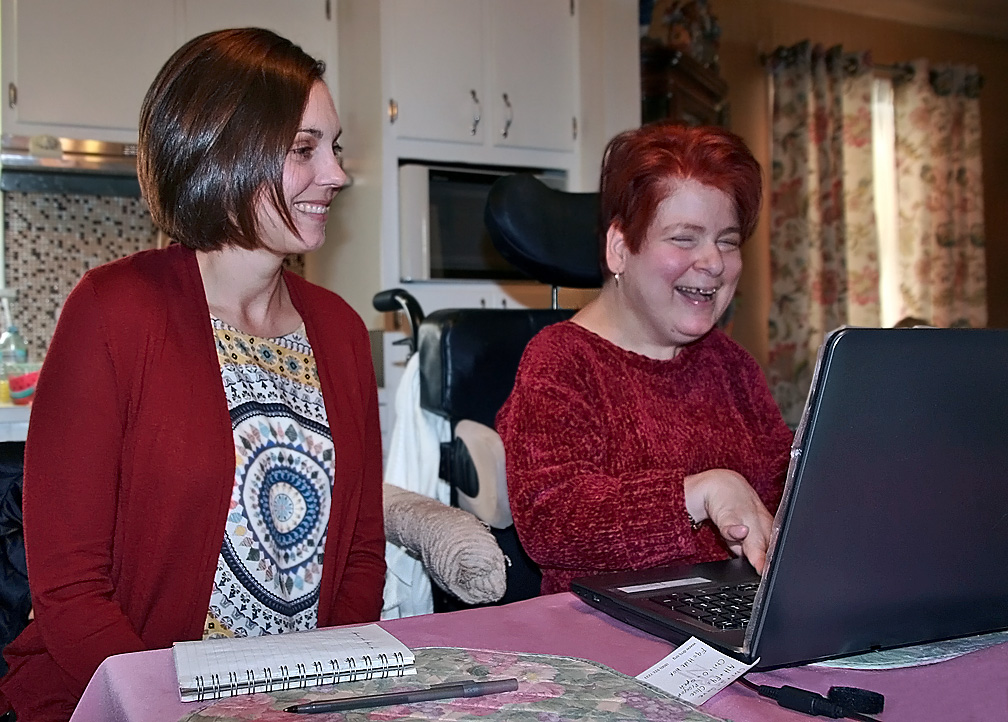
Stephanie P. (RIGHT) enjoys using the computer all the more with the support of Assistive Technology Specialist Kristen Russell.
“Though I’m just learning,” Stephanie P. says, “I feel more independent.” Stephanie, a woman with cerebral palsy, in her early 50s, is a life-long learner who loves researching (more about that later on). In addition, she enjoys browsing the many offerings on Amazon.com. However, because of the limited physical mobility her condition afforded her, Stephanie had used the computer only rarely. However, as she realized the importance of this tool for her scholarly research, she sought to change that.
An Old Acquaintance
Last year, Stephanie and her mom, Alberta, saw a familiar face at the Ability Expo in Edison, N.J. (We’ll be there again this year!) Indeed, the person was none other than Garth Heid, Assistant Director of Assistive Technology Services, and an acquaintance from 40 years ago! Through Garth, Bert contacted Advancing Opportunities and was connected to Assistive Technology Specialist, Kristen Russell. Together, they tried various adaptive keyboards and joysticks. Yet, Stephanie found that she enjoyed using her regular laptop keyboard, what the population at large uses. At that point, Kristen realized that what Stephanie really needed was software that was compatible with her needs and limitations; she recommended a software program called WordQ. “It worked really well,” says Kristen. “It was a team effort.”
…And a New One: Introducing WordQ

Laptop computers can accommodate powerful programs like WordQ.
Photo by Matthew Bowden, via Wikimedia Commons
With WordQ installed on her device, Stephanie is learning keyboard shortcuts, which are much easier for her than using a mouse. In addition, Kristen changed the accessibility features already built in the Windows 7 operating system on Stephanie’s laptop. For example, the “sticky keys” feature allows Stephanie to type in her keyboard shortcuts in two separate steps rather than having to hold down the keys together. “This is easy to learn,” says Kristen; Stephanie said she readily agreed. (Abby, a college student with dyslexia and a client of ours who also has a lifelong love of earlier, also used WordQ with success.)
WordQ provides an interface with most text-based apps, both offline word-processing programs and online Internet browsing and e-mail. Granted, anyone who has texted with a smartphone (and that would be most of us) has experienced word-prediction software. The convenience and saving of time are readily apparent. For individuals with various disabilities, this technology can be much more than merely an expediency. With Stephanie’s cerebral palsy and limited hand control, typing each letter of a word accurately is laborious. She needed word-prediction software that is quick and can suggest words or phrases with far fewer keystrokes than what mainstream apps offer. And WordQ can do that, suggesting a suitable word with only one or two keystrokes. Built-in text-to-speech technology says each letter and word out loud, which has helped Stephanie hear mistakes or confirm that what she typed is correct. (Indeed, we will cover WordQ in greater detail in this space next week!)
Moving On
When her physical therapist heard that Stephanie could use the computer and keyboard, she recommended Stephanie try a power wheelchair she could operate herself. She had never been provided with a power wheelchair in the past, but was thrilled with the possibility of this increase in her independence. She had an opportunity to develop her skills in driving a power wheelchair during lessons over the summer and fall. Speaking about the wheelchair, Stephanie said, “It was so comfortable,” as she expressed and her mom expressed excitement about getting the equipment. She hopes to get her new power wheelchair soon, and is very excited for another way to increase her independence.
For now, though, Stephanie is grateful for the opportunity to pursue her passion for learning and discovery on her computer. She already has a Bachelor’s degree in religious studies, having graduated with honors. With WordQ, Stephanie can continue to research the archives of the Vatican Library. Her mom adds that Stephanie “not only answers questions but also wants to know why.” Says Bert, “Stephanie has an inquisitive personality.” As for Facebook, Stephanie does not care for the social media platform. “Too much drama,” she says.
Stephanie and her mom are quick to point out that Kristen is very knowledgeable, patient, and positive. Says Bert, “She is a blessing. Stephanie looks so forward to her coming.” “She is so nice,” says Stephanie. “I love her.”
Monday Motivation
Assistive Tech Tuesday
Assistive Tech Success – Stephanie P


